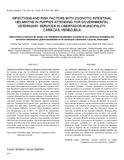Mostrar el registro sencillo del ítem
Infecciones y factores de riesgo con helmintos intestinales zoonóticos en cachorros atendidos por servicios veterinarios gubernamentales en el municipio Libertador, Caracas, Venezuela
| dc.rights.license | http://creativecommons.org/licenses/by-nc-sa/3.0/ve/ | es_VE |
| dc.contributor.author | Rey Valeirón, Catalina | |
| dc.contributor.author | Dietes, Yoselín | |
| dc.contributor.author | Chávez Oberto, Víctor | |
| dc.contributor.author | Andrade, José Vicente | |
| dc.contributor.author | Pérez, Keila | |
| dc.contributor.author | Garcia, Víctor | |
| dc.date.accessioned | 2018-11-06T19:58:52Z | |
| dc.date.available | 2018-11-06T19:58:52Z | |
| dc.date.issued | 2018 | |
| dc.identifier.issn | 0798-2259 | |
| dc.identifier.uri | http://www.saber.ula.ve/handle/123456789/45359 | |
| dc.description.abstract | Los helmintos intestinales de los perros son patógenos con potencial zoonótico para los humanos. Esas infecciones pueden tratarse eficazmente con antihelmínticos, pero en países que sufren crisis económicas, el control de las enfermedades parasitarias puede ser difícil. El objetivo del estudio fue evaluar la prevalencia de helmintos intestinales zoonóticos en cachorros que asistieron a servicios veterinarios gubernamentales en el municipio Libertador, Caracas, Venezuela y los factores de riesgo asociados a la parasitosis. Se diseñó un cuestionario para recopilar información sobre el perro y propietario, las prácticas de manejo y evaluar el conocimiento sobre los riesgos de los parásitos para la salud animal y humana. Se obtuvieron muestras de heces de cachorros entre 1 y 6 meses de edad (n = 272) y se analizaron mediante la técnica de flotación en solución hipersaturada de azúcar. Las asociaciones entre el parasitismo, el hospedador y las prácticas de manejo se cuantificaron mediante análisis univariables y odds ratio. Se observaron huevos de helmintos en 66,3% de las muestras (180/272); Toxocara canis, Dipyllidium caninum y Ancylostoma spp. en 45,2; 11,8 y 5,5%, respectivamente. Un 82,5% de los cachorros estaba restringido al hogar y de éstos, 66,82% estaban parasitados. El propietario de sexo femenino, la frecuencia de limpieza y el conocimiento sobre zoonosis causadas por los parásitos constituyeron factores de riesgo. Debido al alto nivel de cachorros infectados y a que la mayoría de los propietarios ignoran los riesgos zoonóticos se concluye que los cachorros pueden constituir una fuente importante para infecciones parasitarias humanas en el municipio Libertador de Caracas. | es_VE |
| dc.language.iso | es | es_VE |
| dc.publisher | SaberULA | es_VE |
| dc.rights | info:eu-repo/semantics/openAccess | es_VE |
| dc.subject | Helmintos | es_VE |
| dc.subject | Caninos | es_VE |
| dc.subject | Factores de riesgo | es_VE |
| dc.subject | Venezuela | es_VE |
| dc.subject | Servicios veterinarios públicos | es_VE |
| dc.title | Infecciones y factores de riesgo con helmintos intestinales zoonóticos en cachorros atendidos por servicios veterinarios gubernamentales en el municipio Libertador, Caracas, Venezuela | es_VE |
| dc.title.alternative | Infections and risk factors with zoonotic intestinal helminths in puppies attending for governmental veterinary services in libertador municipality, Caracas, Venezuela | es_VE |
| dc.type | info:eu-repo/semantics/article | es_VE |
| dcterms.dateAccepted | 26/06/2018 | |
| dcterms.dateSubmitted | 06/04/2018 | |
| dc.description.abstract1 | Intestinal helminths of dogs are pathogens with zoonotic potential for humans. Dogs can be effectively treated by anthelmintic drugs, but the control of parasitic diseases may be difficult in those countries that are suffering an economic crisis. The aim of the study was to assess the prevalence of zoonotic intestinal helminths in puppies attending to governmental veterinary services in Libertador Municipality, Caracas, Venezuela, and the risk factors associated to the parasitic infections. A questionnaire was designed to collect information about the dog and their owner, dog management practices and to assess owners’ awareness about the risks of parasites for animal and human health. Fecal samples obtained from the puppies between 1-6 months old (n = 272) were analyzed by microscopy after flotation technique with saturated sucrose solution. Associations between parasitism, host and management practices were quantified by univariate analyses and odds ratios. Helminths eggs were found in 66.3 % of the samples (180/272); Toxocara canis, Dipyllidium caninum and Ancylostoma spp. in 45.2; 11.8 and 5.5 %, respectively. Of 82.5% of the puppies restricted at home, 66.82% were parasitized. Female owner, frequency of cleaning of feces and knowledge about zoonoses caused by dog parasites constituted risk factors by univariate analysis. Due to the high level of infected puppies and that most of the owners ignore about zoonotic risks of parasites, dogs can be a major source to human infections in Libertador Municipality in Caracas. | es_VE |
| dc.description.colacion | 274-281 | es_VE |
| dc.identifier.depositolegal | pp199102ZU46 | |
| dc.identifier.edepositolegal | ppi201502ZU4665 | |
| dc.identifier.eissn | 2477-944X | |
| dc.publisher.pais | Venezuela | es_VE |
| dc.subject.institucion | Universidad del Zulia (LUZ) | es_VE |
| dc.subject.institucion | Universidad de Los Andes (ULA) | es_VE |
| dc.subject.keywords | Helminths | es_VE |
| dc.subject.keywords | Dogs | es_VE |
| dc.subject.keywords | Risk factors | es_VE |
| dc.subject.keywords | Venezuela | es_VE |
| dc.subject.keywords | Public veterinary services | es_VE |
| dc.subject.publicacionelectronica | Revista Científica | |
| dc.subject.thematiccategory | Medio Ambiente | es_VE |
| dc.subject.tipo | Revistas | es_VE |
| dc.type.media | Texto | es_VE |
Ficheros en el ítem
Este ítem aparece en la(s) siguiente(s) colección(ones)
-
Revista Científica - 2018 - Vol.XXVIII - No. 004
Julio - Agosto 2018


